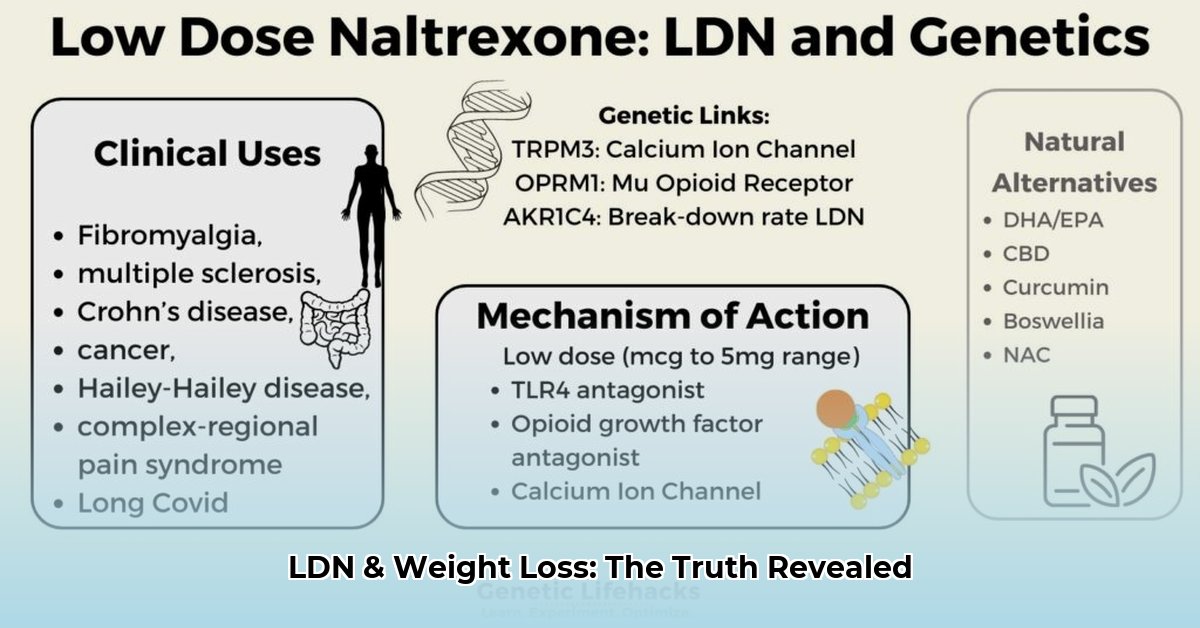
Low-dose naltrexone (LDN), a medication initially used to treat opioid addiction, has garnered interest for its potential off-label applications, including weight loss. This article explores the scientific evidence supporting or refuting this claim, examining potential mechanisms of action and reviewing existing research.
Could LDN Contribute to Weight Loss? Exploring Potential Mechanisms
The purported link between LDN and weight loss isn't fully understood, but several theoretical mechanisms have been proposed. Crucially, more rigorous research is needed to confirm these hypotheses.
Appetite Suppression
Some suggest LDN might suppress appetite, potentially leading to reduced caloric intake. However, the evidence supporting this mechanism is weak and inconsistent across studies. More robust research investigating this potential effect is urgently needed.
Insulin Sensitivity
Another proposed mechanism centers on improved insulin sensitivity. Enhanced insulin sensitivity could improve glucose metabolism, potentially aiding weight management. However, existing data on LDN's impact on insulin sensitivity is minimal and inconclusive.
Thyroid Function
The thyroid gland plays a crucial role in metabolism, and some speculate that LDN might influence thyroid function, thereby indirectly affecting weight. Currently, there is no strong scientific evidence to support a direct link between LDN and clinically significant changes in thyroid hormone levels that lead to weight changes. Further studies are necessary.
Sleep Improvement
Improved sleep quality is associated with better weight management. Some anecdotal evidence suggests LDN may enhance sleep; however, this potential benefit is indirect and doesn't guarantee weight loss. A causal link needs to be established through rigorous research.
Evidence Review: A Critical Assessment of Existing Research
The scientific literature on LDN and weight loss is limited and often contradictory, hindering definitive conclusions. Several significant methodological limitations hamper the interpretation of findings.
Many studies are small, making it difficult to detect statistically significant effects. Furthermore, the lack of large, randomized controlled trials (RCTs) – the gold standard in medical research – prevents robust conclusions about LDN's efficacy in weight loss. Existing studies often lack control groups or employ different methodologies, making direct comparisons challenging.
A summary of the current evidence, highlighting its limitations, follows:
| Category | Summary of Findings | Limitations |
|---|---|---|
| Appetite Changes | Limited and inconsistent evidence suggests potential appetite reduction. | Small sample sizes, heterogeneous study designs, absence of robust, placebo-controlled trials. |
| Insulin Sensitivity | Insufficient data to establish a conclusive link between LDN and insulin sensitivity. | Few studies directly investigate this aspect; larger, well-designed RCTs are necessary. |
| Thyroid Function | No significant evidence links LDN to clinically relevant changes in thyroid function. | Existing studies lack adequate power to detect subtle effects; further dedicated research is required. |
| Sleep Quality | Anecdotal reports suggest potential improvement but lack rigorous scientific backing. | Correlation doesn't equal causation; more research needed to determine a direct effect on weight loss. |
| Overall Weight Change | Limited and inconclusive evidence supports LDN as a primary driver of weight loss. | Small sample sizes, inconsistent results across studies, methodological limitations hinder definitive conclusions. |
Clinical Significance and Considerations: A Balanced Perspective
Based on the current, limited evidence, there's no conclusive proof that LDN directly causes significant weight loss. While some individuals may experience weight loss while using LDN, it's crucial to consider this alongside other lifestyle factors and potential confounders. A holistic approach to weight management, including diet, exercise, and stress reduction, remains the most reliable strategy.
Moreover, LDN can have side effects, such as nausea, fatigue, and vivid dreams. It's essential to consult a healthcare professional before considering LDN for weight loss, especially if you have underlying conditions or are taking other medications. Self-treating with LDN without proper medical guidance is strongly discouraged.
Conclusion: The Verdict on LDN and Weight Loss
Currently, there is insufficient robust scientific evidence to confirm that LDN causes clinically significant weight loss. While some studies hint at potential mechanisms, their limitations prevent drawing definitive conclusions. A balanced approach to weight management, emphasizing lifestyle changes and medical supervision, remains the most effective and safe strategy. Always consult a doctor before using LDN or any other medication for weight loss.